Text
Goodbye to Our Seniors!

On Friday, May 4th, the Student Ambassador Program wrapped up with End of Year Presentations to professional staff members from both the CCD and the ERC! We also had our end of year party, and said (emotional) goodbyes to long-standing senior SAs Claire, Lola, Sam, Windy, Mira, Aastha, Anh, and Emily. Best of luck to all of our wonderful seniors, and please keep in touch!
Congratulations, BU Class of 2018!
#SAP#student ambassador program#seniors#goodbye#graduation#students#jobs#campus#boston#boston university#bu#terriers#2018#class of 2018#grad#grads#commencement#ceremony#party#celebration
2 notes
·
View notes
Photo
Study inspo of the week! If color brightens up your studying time, then go with it! Come to the Educational Resource Center at Boston University for more study tips and tricks.

100 Days of Productivity - Day 70/100
March 11th, 2018
Here’s an old picture of annotations I completed a while ago. Today was a really lovely day - I watched a history documentary on Netflix and completed some modern readings on the Romanovs (because I’m a major history nerd).
Also, seeing as I just recently reached 12,000 followers on this blog (which is crazy), I was considering starting a YouTube channel. I would post study with me videos, study advice videos, book review and recommendation videos, maybe some lifestyle and gaming videos. What do you guys think? Would you be interested in seeing that kind of content?
Insta @ isthisnametakenyet
6K notes
·
View notes
Text
How to Manage Your Time Most Effectively
By Chloe Gao
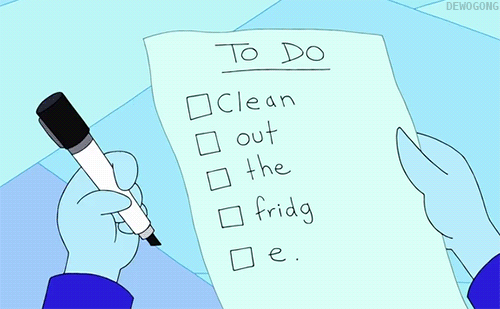
It seems impossible to keep a good balance of academic, social life, and sleep in college. You don’t have to give up any of the three, if you know how to manage your time wisely. With good time management, it’s possible to have a balanced and healthy life. Here are three tips to help you manage your time better.
Present your tasks visually
Download the Google Calendar app or grab a time grid from the Educational Resource Center (ERC). It doesn’t matter whether you do this online or offline. If you choose to use the ERC time grid, color the time slots which you have classes in one color, and your time to sleep in another. Also color the time slots which you have club meeting, or need to work. With Google Calendar, you can set an alarm prior to the event start time. Presenting your tasks visually gives you a better understanding of your schedule. You have less tendency to procrastinate.
Set reminders for important events
The best time to get this done is the beginning of a semester. After you’ve determined the classes you’re taking, spend an afternoon going through your syllabi. The most effective app is Google Calendar, which allows you to set reminders for repeating events with one simple click. Put your dues in red. Red calls your attention and gives you a feeling of urgency. Also put your midterms and quizzes in red. Put down office hours if you like. Put your extracurricular events in yellow, lunch with friends in green, etc. Going through your calendar in the beginning of each week gives you a better sense of how light or heavy your week is going to be. And based on the workload of the week, you may want to prioritize your academics over happy hours.
Do work for 5 minutes
It’s been a long day and you finally get back to your room. Laying on your bed and playing with your phone is all you want, but there’s this essay which you better get done by tonight. You constantly check the time while you’re chilling, and you say to yourself, “I’ll get started in another 15 minutes”. As time goes by, you’re getting tired and really don’t feel like writing that essay. A good way to prevent this from happening is to start working on your essay for 5 minutes. Play some white noise if it helps you to focus. Do one unpleasant but necessary task for 5 minutes and see how you feel. Most of the time, you keep working on the task after the first 5 minute.
The best way to reduce or prevent stress is taking control and making predictions. By visually presenting your schedule and set reminders for important events, you can predict stress-inducing events. Once you get out of your bed and start working for 5 minutes, you take control of your time and beat procrastination. Last but not the least, it’s important to understand yourself and your priorities. If you value your social life or sleep more than your academic, you can still succeed in time management even if you push away assignments for more sleep.
#educationalresources#educational resource#resource#education#BU#Boston#Boston University#University#college#student#student life#city#city school#school#Chloe Gao#office#time#time management#management#gif#tips#study#staff
3 notes
·
View notes
Text
Studying for English and Written Exams
By Meredith McDuffie

A big misconception about English is that most of the time it’s applying meaning to things that don’t mean anything. Looking at it this way can get frustrating. English and writing exams are actually all about forming arguments and proving why you’re right, using elements from the text as evidence.
Most English and writing classes are discussion based, which means a lot of the time you’re taking notes on the conversation happening between your professor and classmates. One challenging thing about this is sometimes it can be hard to figure out what part of the conversation is worth taking notes on. Pay attention to the conclusions your professor is making about the text and which parts of the text they’re using to prove this. Also, pay close attention to any themes, motifs, or symbolism in the text, as these things will build the foundation of your argument.
Some good guiding questions to answer while you’re doing the reading are: what is this text about? What are the major themes of this text? What is the author trying to say, and how are they saying it? How is this text related to other ones in the course? Write down whatever you can before class, even if it’s only a few words or undeveloped ideas, so you can discuss them or reference them during class.
There are a few ways to study for English and writing exams. The first thing you should do is re-read the text, or at least the important moments in the text. You’ll want to be able to answer questions like: who are the main characters? Where does everything take place? Where do they go, and what challenges do they face? These may seem like pretty basic questions, but going through the basics can help keep you from mixing up all the different characters, themes, and plots from various texts.
Another thing to study is how all the texts on the exam relate to each other. Do they share similar themes or opposing ones? If they’re opposing themes, which text makes a better argument and why? This not only helps you understand the texts better, but often professors will ask you to compare texts on exams.
Finally, participate in discussions of the texts with your classmates, and especially with your professor. They can help guide you through your own arguments you aren’t sure how to articulate or formulate yourself. This will help prepare you for the arguments and short essays you’ll have to write during your exam.
Good luck, everyone!
#BU#Boston#Boston University#student#student life#educationalresources#college#university#Meredith McDuffie#staff#offices#student ambassador program#student ambassador#english#writing#exam gloves#education#gravity falls
1 note
·
View note
Text
Getting to Know Your Professors
By Sam Moseman
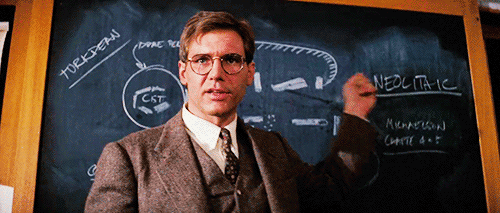
College has many great things to offer, but one of the most important advantages is the ability to talk to an expert in almost any field, every single day. And the best part about it is that in most circumstances they are very excited to talk to you as well. Forming a relationship with a professor can lead to many great opportunities including research, an internship, or even just having a mentor to talk to.
The best way to get in contact with professors is almost always in person, because they usually receive a lot of emails in a day and that makes it much more difficult for them to actually remember who you are. So either find out when they have office hours or even just try to talk to them after class; most of them will be happy to talk for a few minutes. A face-to-face interaction is also a better way to show your personality and enthusiasm about their subject.
When you do approach a professor it is always helpful to show interest in their area of study; if you only talk to them in the last week of class and just ask about your grade they will be much less likely to help you. If you are asking a question about class, make sure you have attempted the problem on your own, and bring in the work you have done so far. Stating a question such as “I know I need to do this, so I started with this step, but now I’m stuck here” is much more effective than simply saying “I don’t know how to do it”. You should not expect your professor to reteach their entire lecture just for you; your questions should be targeted at specific parts of the subject to show that you have made an effort.
If you are asking about a research opportunity be sure to first read up about what they are doing. You can look up a professor’s CV online and you can usually find at least some of the papers they have written as well. Even if you don’t understand the entirety of their research, at least being familiar with the main topics will be helpful in showing your qualifications. And even if your goal is to get a research position, it will most likely be more effective to lead with an interesting question or observation about their work rather than ask for a job right away.
At the end of the day, just approaching your professors while showing eagerness for their subject will go a long way. Don’t be intimidated, ask good questions, and remember that they are here to help you learn. Be sure to get the most out of college by getting to know some of the many great professors here at BU!
#educationalresource#educationalresources#educational resource#education#student#student life#university#college#college life#BU#Boston#Boston University#professors#Indiana Jones#Sam Moseman
2 notes
·
View notes
Text
Most Common Resume Mistakes – and How to Fix Them!
By Claire J. Lenz (QST ‘18)

As a reviewer for the Center for Career Development, I see a lot of resumes come through the center on a weekly basis. In this week’s post I’ll run through some common mistakes I’ve seen in my appointments to help you put the finishing touches on your resume! I’ve categorized these suggestions into five categories: Section Order, Date Ranges, High School, Action Verb Tense, and Contact Information.
Keep in mind this advice is by no means law, but is more meant to give you a sense of what to look out for in your resume. That said, it’s always a good idea to get personalized help with a trained reviewer if you’re not sure where to begin or need a second pair of eyes, so feel free to make an appointment at the CCD through Handshake and we’d be happy to help!
1. Section Order: The structure of your resume is determined by how you organize your resume sections (headers such as: work experience, skills, and education) so it is important to be thoughtful about the order in which you present your experiences.
· As a student, your primary identifier is your university as it provides context for the rest of your experiences and activities on your resume. Make sure you put your education first!
· Follow your education section with your experiences, which can be segmented further into “leadership,” “volunteer,” “work,” or my personal preference: “relevant” and “additional.”
· Some occupations prefer to list skills directly after education, especially if the field is particularly technical.
· Consider including other resume sections, such as projects, awards, or certifications depending on what applies to you.
· Any occupation where you gained skills or learned something relevant to your personal growth – paid or unpaid – is fair game for classification as an experience.
2. Date Ranges: I tend to get really picky about this, but it’s important! Each experience you list should include dates to contextualize the timeline of your resume.
· Make sure the way you write your dates is consistent throughout the resume. If you abbreviate September to Sept once, make sure you keep it that way.
· If a date range falls within the same year, you do not need to list the year twice. For example, you can say July – October 2017 instead of July 2017 – October 2017
· If a date range falls across multiple years, list the year next to both months. For example: September 2016 – May 2017
· If you are currently working in a position, list the second date as “Present.” For example: July 2017 – Present
· Your experiences within each section should be listed in reverse chronological order, with the most recent position at the top.
· Finally, ensure the dash between the dates is consistent throughout the page. This is one of the most common mistakes I’ve seen and comes off as super sloppy!
3. High School: Once you reach your sophomore year of college, it’s time to remove your high school and any related activities you did before college. The only exceptions to this rule are:
· If you are still currently participating in an activity from high school
· If you are interviewing with an alum from your high school
· If you are applying to a job that may recognize your school (whether it’s in the area or is prestigious)
4. Action Verb Tense: For each of your position descriptions, ensure the verb tense lines up with the date range of the activity.
· Experiences from the past should be written in past tense.
· Current positions should be written in the present verb tense.
5. Contact Information: This may be a small section on your resume, but it is important your contact information is accurate and conveyed in a professional manner.
· Make sure your email address is professional – generally I suggest students use their university email address.
· Include any LinkedIn or personal portfolio pages, as long as they are professional!
· Use your school address unless you are applying to a job at home; in that case, you can use your home address.
I hope this helps!
~Claire
Resume Resources at the Center for Career Development:
· Make an appointment during our Resume + Cover Letter Review Hours.
· Check our calendar for workshops on writing effective resumes and cover letters.
· Resumes 101: Learn the difference between functional and chronological resumes, and how best to get started.
· Anatomy of a Resume: Explore our interactive resumes and learn what sections to include.
#careerdevelopment#career development#career#student#student life#college#university#resume#BU#Boston#Boston University#college life#Claire Lenz
0 notes
Text
Creating a Workspace in a Dormitory
By Alexa Greer

When you live in a dorm room, it can be hard to separate your personal stuff from your school stuff, but doing this is really important! Having a separate work space and relaxing space helps your mind to know when to focus and when to take a break. Here’s what I’ve done in my dorm room to create an effective working environment.

I like to keep my desk tidy, with as few things as possible on it. A cluttered space can have a negative impact on your state of mind, so only keep out what you need all the time. For me, that’s my computer.
................................................................................................................................
My microwave-fridge is next to my desk and comes in handy as extra wall space. These appliances are magnetic, so are perfect for keeping a magnetic pen holder within arm’s reach without adding more clutter to my desk.
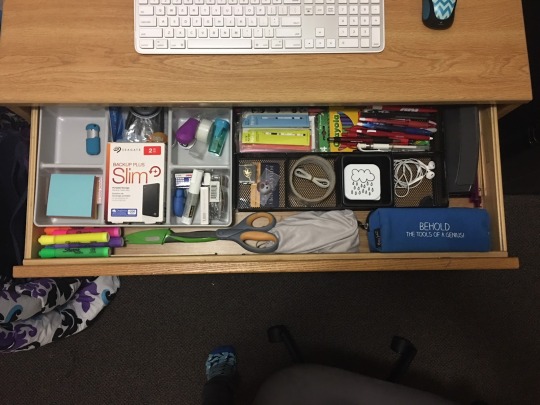
Over time, it became really difficult to find anything in my desk drawer, so I decided to use drawer dividers to organize my stationery. Now I can easily grab anything I need, from a hole punch to a USB drive.
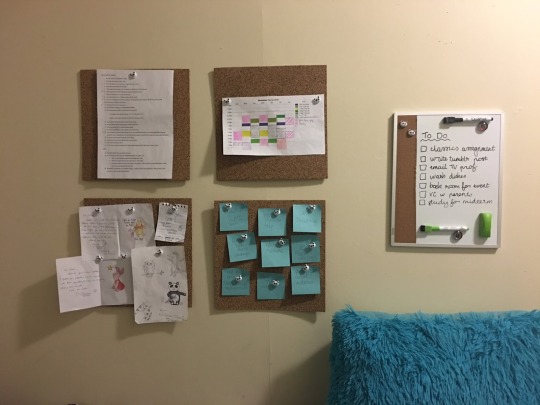
Above my bed, I stuck up some cork tiles and a mini whiteboard. Each tile has a different purpose and I use the whiteboard for to-do lists. Since they’re all above my bed, I see them all the time.
................................................................................................................................
Every college student knows that under-bed storage is a dorm room lifesaver. In my case, I used bed risers to add some extra height for storage bins. I use one of these bins for college-related items too big to fit anywhere else, including textbooks, binders, and stationery like extra lined paper.
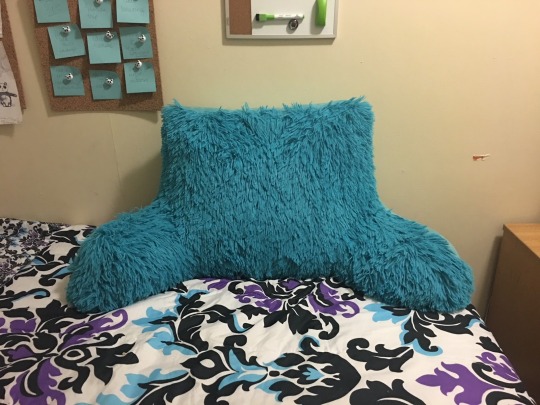
Finally, for those days when all you want to do is curl up with a blanket but you still have an assignment due - me all the time - I love having a chair cushion on my bed. Sometimes you have to make an exception to the work/relax separation rule to get through a freezing Boston winter filled with homework and exams.
I hope these tips have given you some dorm inspo to help you crush your course load. Midterms will be over soon - you’ve got this!
#boston university#boston#bu#college#university#student#student life#study#study inspo#dorm#dormitory#workspace#Alexa Greer#office#staff#educationalresources#midterms#studentlife
9 notes
·
View notes
Text
Extracurricular Activities and Your Professional Future
By Sarah Bickford

When a student first arrives at college, they are immediately bombarded by student organizations vying for prospective new members. At the same time, students are constantly worried about preparing for their professional future, often struggling to choose a career path. However, these concerns do not need to be mutually exclusive. Extracurricular activities can help you prepare for your professional future through networking, skill building, and exploration. Any of these activities can be good ways to get involved with a field you already love, or serve as a platform for you to explore a possible interest without the commitment of classes or a major.
1. Professional clubs
These clubs are designed specifically for pre-professional development and field-based activities. They often host events related to their field, provide resume advice, and hold networking events. Many of these groups have chapters across the country.
Some examples include: Undergraduate Psychological Association, Biomedical Engineering Society, American Hotel and Lodging Association, and the Geological Society.
2. Professional fraternities
Some of these professional clubs come in the form of professional fraternities, which are gender-inclusive groups designed with the same intention as the clubs but with a slightly different and more social atmosphere.
Some examples include: Alpha Chi Sigma (chemistry), Alpha Kappa Psi (business), and Delta Kappa Alpha (cinema).
3. Clubs related to your field
These clubs are often a bit more general than the professional clubs. They may have a more relaxed atmosphere or have a greater focus on community service with one community organization.
Some examples include: Financial Modeling Club, herNetwork, Make_BU, Mind and Brain Society, and Mock Trial.
4. Volunteer at a community organization related to your field
One of the best ways to gain skills in a field and exposure to what it involves is to work with organizations doing the work you may one day want to do. Sometimes these experiences can help you give back to your community while also providing you with the opportunity to test the waters of a possible career. There are a number of on-campus groups associated with such service but there are countless options off campus as well.
Some examples include: Autism Speaks, Peer Health Exchange, Sustainable Ocean Alliance, League of Women Voters, and New England Aquarium.
5. Simply do something you enjoy or try something new and develop skills along the way!
One of the best things about college organizations is that you do not need to feel obligated to join any of the above mentioned groups just for the sake of your resume. If you have no interest in these organizations, you do not have to join them. Pursuing your interests regardless of your other involvement in professional groups will make you a more well-rounded person. At the same time, the skills you develop in these settings (particularly if you take leadership roles) will help you prepare for your professional future while also building skills you can put on your resume, such as leadership, event planning, and marketing.
No matter what activities you choose to do, college is a great time to delve deeper into fields you love and also to try something new. All of these activities are phenomenal opportunities to grow as a person and as a professional.
For a full list of Boston University clubs, see:
http://www.bu.edu/studentactivities/get-involved/
For a search engine for potential volunteer organizations, see:
https://www.volunteermatch.org/
or
https://www.idealist.org/en/?radius=40000&type=ALL
#bu#student life#boston university#boston#college#univeristy#student#professional#career#careerdevelopment#offices#staff#Sarah Bickford#skills#networking#studentlife
1 note
·
View note
Photo
Study inspiration!

115 | I actually live in the library now, I have adversely possessed this seat
#educationalresource#bu#boston#boston university#study inspo#study inspriation#notes#note taking#student#college#university#student life#college life
938 notes
·
View notes
Text
How to Keep Track of Your Networking Circle
By Lola Adeosun

“Your network is your net worth,” is a phrase that many college students hear at some point in their collegiate career. I know when I first heard it, the saying stuck with me. The importance of networking and building a circle of people you connect with has never been lost on me, especially considering that I work in BU’s Center for Career Development. However, I will be the first to admit that formal networking is not always easy. At times, it feels unnatural, and making a concerted effort to connect with someone in uncomfortable situations – think reception for a play and you’re the new intern that knows not a soul- can be difficult to say the least.
This article isn’t intended to be a “How to Network 101” piece; we’ve all been privy to those guides, and if not, Google does it better than I ever could. Instead, I simply want to share a piece of advice a colleague last summer gave to me that changed the way I organized and conceptualized my networking circle.
It all started with a spreadsheet. If you’re anything like me, then the idea of keeping track of the people you meet over your lifetime can seem overwhelming. Networking is more than exchanging business cards over appetizers, although that is certainly one form it takes. You network with your teachers and professors in school, with your classmates and peers, with people you sit next to on an airplane, or your neighbors at home, and even your family. One should be aware of all the connections they make over time, because you never know who could be there for you in the future. However, it’s not easy remembering the information of that high school teacher you took a course with almost ten years ago. Additionally, there would be times at events that I would leave with multiple business cards and names of those who I had the pleasure of conversing with. I would tuck them away in my wallet, only to squint at them months later trying to recall the details of how I acquired said cards. What did we connect over? What was the context of our conversation? Of course, there were interactions that were memorable and etched in my mind, but for those that weren’t, it felt like a lost connection.
So when my colleague told me that he had a spreadsheet that he used to keep track of his networking, I immediately knew this was a tool I needed in my life. It’s simple: create a spreadsheet with columns such as “Name”, “Context” (how you met), “Email/Contact”, “Occupation”, and “Contacted?” (Have you reached out to the person?). In the “Context” column, I also include things like if they have written me a recommendation letter, or something of that nature.
I included a snapshot of my spreadsheet below with the exclusion of personal information. I have three separate sections: blue is for those I meet in educational settings, green is for work and internship experiences, and purple is for personal connections (i.e. family friends or what does not fit in the aforementioned categories). When I meet someone new who I know I would like to remember, I do my best to jot down their information in the spreadsheet while it’s fresh.

Keeping an organized spreadsheet like this has really helped me to see just how many connections I’ve made in my lifetime. It memorializes people, and provides every interaction with even more meaning. It’s not only inspiring, but also mentally helpful to know I can turn to this list if I ever need to jog my memory!
#Lola Adeosun#careerdevelopment#staff#office#BU#Boston University#University#college#Boston#networking#career#job#student#student life#spreadsheet#colleague#SAP
3 notes
·
View notes
Text
My Internship Journey in Washington D.C.
By Windy Wang

I joined the Boston University Study Program in Washington D.C. program in Fall 2017. It is such a meaningful experience for me, during which I not only experienced the diverse community in Washington D.C., but also improved my communication and networking skills. Besides taking courses at Boston University D.C. office and George Washington University, I did an internship with Wilson Center as a research assistant, focusing on international economies and trade. I am very excited to share my internship experience in this blog!
Woodrow Wilson International Center for Scholars (Wilson Center) is an authentic think tank tackling international policies. Located in the downtown Ronald Reagan International Trade Center at Washington D.C., it is close to the White House, government agencies, and colleges. The scholars, staffs, and interns at Wilson center have such diverse backgrounds that there are always exciting things to discuss and share. As a scholar intern, I worked closely with two scholars on issues of international trade. I did research on North American Free Trade Agreement and China’s economic policies relating to the State-Owned Enterprises, fiscal policies, and emerging urban middle class. The papers and books I read have provided me with great insight on international development and deepened my understanding of Sino-US relations.
I am so grateful to have had this internship experience at the Wilson Center. The people and the culture inspired me to pursue my passion for international trade after graduation. I definitely miss my time in Washington D.C. To summarize and look into the future, I want to quote what a scholar told us at the Christmas celebration: “Wherever you go, there are always trees with lights.”
#Windy Wang#Washington DC#internship#careerdevelopment#BU#Boston#Boston University#Woodrow Wilson#Woodrow Wilson International Center for Scholars#university#college#student#student life#staff#offices#SAP#studentlife
1 note
·
View note
Text
Claire Saloff-Coste
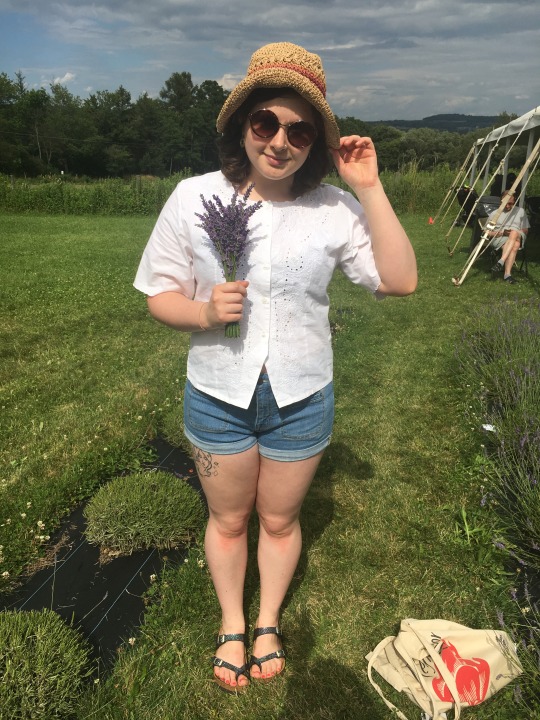
COM: Cinema and Media Studies (Minor: Visual Arts) | 2020
2nd Semester as a SA | Public Relations Team
When you’re not in class or at work, what can you be found doing?
Drawing, going to the cinema, playing video games, and reading Stephen King.
Why did you want to become a Student Ambassador?
The Center for Career Development was so valuable to me when I was a freshman and wanted to do marine science, Asian studies, film and TV, and visual arts all at the same time!
What is something interesting that most people don’t know about you?
When I was a child, I auditioned to be a snowflake in the Moscow Ballet’s performance of The Nutcracker in my hometown because my friend was auditioning-- and I got in! (Even though at the time I had stopped taking ballet classes and haven’t taken them since....)
0 notes
Text
Shadae Leslie

COM: PR, CAS: African-American Studies | 2020
2nd Semester as a SA | Programming Team
When you’re not in class or at work, what can you be found doing?
Trying out a new recipe, listening Oprah's SuperSoul Sundays podcast or in the Howard Thurman Center.
Why did you want to become a Student Ambassador?
To share the services that the CCD and ERC offer to all students at BU and grow in an environment that encourages professional development.
What is something interesting that most people don’t know about you?
I haven't had a cup of coffee since starting college...so far.
0 notes
Text
Chloe Gao

COM: PR, CAS: Psychology | 2020
2nd Semester as a SA | Programming Team
When you’re not in class or at work, what can you be found doing?
Working out at Fitrec, enjoying good food with friends, or exploring Allston.
Why did you want to become a Student Ambassador?
I found CCD and ERC resourceful when I was a freshman, and I would love to promote these incredible centers to my fellow Terriers.
What is something interesting that most people don’t know about you?
I lived in Lawton, Oklahoma for a year.
0 notes
Text
Taking Advantage of a City School
By Aastha Thakkar

Hey Terriers! Aren’t we some of the luckiest college students in the country? We go to a world class research university right in the middle of a major city. BU gives us access to a multitude of resources, but the city of Boston has a lot to offer for students as well!
What better way to feel like a part of the Boston community than to follow sports? Even though we didn’t win the Super Bowl this year (boo Eagles) watching a Pats game is always exciting. If football isn’t your thing, we have Fenway around the corner from us to watch a Red Sox game. The Celtics are a short T ride away at TD Garden.
If you don’t like sports, TD Garden also hosts the most popular music artists in concert, like Bruno Mars, Beyoncé and Ed Sheeran. There are some amazing smaller venues such as the House of Blues located even closer to BU. The city is your campus!
Being in a city means great access to professional opportunities as well. From tech giants to startups at Kendall Square to banks in the financial district, you can explore careers and find a good match.
Another great part about going to school in Boston is all the other schools in Boston! The student community is ever-growing.
And my favorite part of being in a city is that I will never run out of different kinds of food to try! So go out and explore, and take advantage of Boston while you’re living here.
#boston#bu#boston university#student life#student#terriers#college#life#explore#city#TD Garden#house of blues#red sox#celtics#patriots#super bowl#Kendall square#staff#office#educationalresources#careerdevelopment#aastha thakkar
2 notes
·
View notes
Text
Emily Williams

CAS: Political Science, History | 2018
2nd Semester as a SA | Partnerships Team
When you’re not in class or at work, what can you be found doing?
Working on my thesis in a cafe, or in a rehearsal for BU On Broadway.
Why did you want to become a Student Ambassador?
I wanted to spend my last year at BU helping students understand the resources available to them for when they have to deal with the job market.
What is something interesting that most people don’t know about you?
I've been playing guitar for 12 years, and collect different stringed instruments
0 notes
Text
Meredith McDuffie

CAS: English | 2020
2nd Semester as a SA | Partnerships Team
When you’re not in class or at work, what can you be found doing?
Reading, going to the movies, or having brunch with my friends.
Why did you want to become a Student Ambassador?
To become more involved in student life and bring awareness to services that are really useful to students.
What is something interesting that most people don’t know about you?
I’ve traveled to over 20 different countries.
0 notes